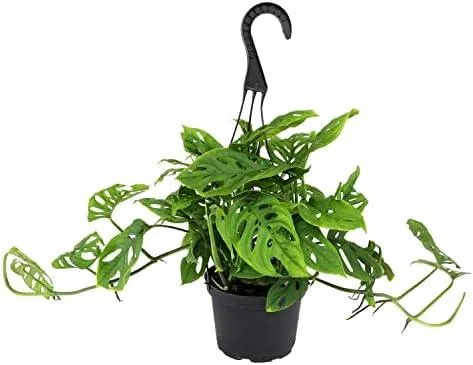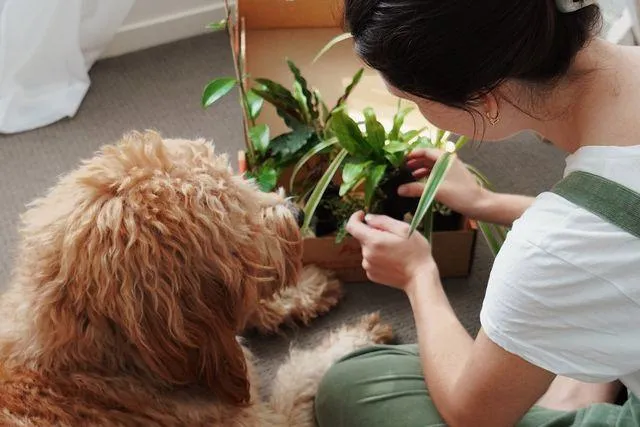Is the Monstera Plant Safe for Dogs?
If you have a four-legged furry friend in your home and also enjoy houseplants, you may be wondering – is the popular monstera plant safe to have around dogs? In this article, I’ll provide a detailed look at the monstera plant and examine whether or not it poses any risks to canine companions. By the end, you’ll have a clear understanding of if monstera plants are generally safe or hazardous for dogs.
Getting to Know the Monstera Plant
Let’s start with the basics – what exactly is a monstera plant? Monstera deliciosa, commonly known as a Swiss cheese plant or window leaf plant, is a tropical flowering plant native to Central America, Mexico, and parts of South America. Known for its large, deeply lobed and pierced leaves, monstera plants are popular houseplants among plant parents. They can grow up to 10-15 feet long when mature and thrive in warm, humid environments with indirect sunlight.
While monstera fruits are edible to humans, the leaves themselves contain calcium oxalate crystals which can irritate the mouth and throat if ingested. From my experience caring for various houseplants, I’ve learned calcium oxalate crystals are a common irritant in many more tropical plants as well. So right away, it’s probably not a good idea for dogs to snack on monstera leaves even if they seem enticing!
Is the Monstera Plant Toxic to Dogs?
When it comes to toxicity, the good news is that most sources list monstera plants as non-toxic or slightly toxic to dogs. The ASPCA animal poison control center categorizes monstera as a “moderate risk” plant, meaning it would need to be ingested in large quantities to cause problems for dogs.
While individual dogs may react differently depending on size, health status and amount consumed, typical symptoms of monstera ingestion in dogs are expected to be mild and may include:

- Mild mouth irritation or discomfort from calcium oxalate crystals
- Vomiting
- Diarrhea
More severe reactions are unlikely unless a very large amount of the plant was consumed. There are no known reports of monstera causing life-threatening toxicity in dogs. So in summary – a few bites of monstera leaves should not cause a healthy dog long-term harm, but it’s still best avoided.
Monstera Safety Tips for Dog Owners
While monstera plants present a low risk to dogs, there are some precautions dog parents can take to keep Fido safe around this popular houseplant:
- Place monstera plants out of your dog’s reach, like on high shelves or hanging baskets.
- If your dog tends to chew on plants, a monstera may not be the best choice for your home.
- Be aware that fallen leaves or chewed pieces could still potentially cause minor stomach upset if ingested.
- As with any new plant introductions, watch your dog closely at first to monitor interactions.
- It’s always a good idea to keep the number for your local animal poison control center handy, just in case.
With awareness and some care, monstera plants can coexist peacefully with curious canine companions. But it’s probably best to view them as an “occasional tasting” plant for dogs rather than a regular snack option!
Alternative Plant Choices for Dog Owners
If you’re looking to bring more greenery inside but want to choose plants that are completely non-toxic, here are some safer options to consider instead of monstera:
- Spider plant – one of the most pet-friendly houseplants. Leaves are not appealing for dogs to nibble on.
- Peace lily – toxic if ingested but leaves generally unappealing to dogs. Good at clearing indoor air.
- Pothos or devil’s ivy – extremely pet-safe. Vines can be entertaining for cats and dogs to chase.
- Chinese evergreen – hardier than it looks. Leathery leaves provide visual appeal without risk.
- Snake plant – tough plant that’s non-toxic even if chewed or eaten. Great for dissuading dogs from plant sampling.
Buying certified non-toxic plants is a nice option if you have an especially curious pup. But common sense precautions like placement and supervision will go a long way with monstera or most other houseplants too!

Final Thoughts on Monstera Safety
In summary, while the monstera plant contains irritating calcium oxalate crystals, it is not considered highly toxic to dogs. Individual dogs may experience minor gastrointestinal upset from ingesting small amounts. But with the right safety measures, monstera can coexist in a home with dogs.
Always monitor new plant introductions, keep plants out of reach of chewing pups, and know the signs of plant toxicity just in case. But there’s no need to totally ban gorgeous monstera plants from your space if you have canine companions. With care and common sense, our green-thumbed pals can enjoy the benefits of indoor plants along with our furry friends.
I hope this overview has helped provide clarity on whether monsteras are generally safe for dogs. Please let me know if you have any other questions! With prevention and vigilance, both our pets and our houseplants can thrive together indoors.
Is Monstera Safe for Dogs?
| Part of Monstera | Safety for Dogs |
|---|---|
| Leaves | Generally safe unless eaten in large quantities which could cause mild stomach upset |
| Stems | Safe unless dog chews on and eats large pieces which could cause an intestinal blockage |
| Berries | Toxic to dogs, can cause vomiting and diarrhea |
| Rhizomes | Contain oxalate crystals which can cause complications if ingested |
| Nectar | Non-toxic but high in sugars and not nutritional for dogs |
FAQ
-
Is a monstera plant toxic to dogs?
Yes, monstera plants can be harmful for dogs if they eat parts of the plant. Most parts of the monstera, like the leaves, stems and fruits are not good for dogs to chew on or swallow.
-
What parts of a monstera are poisonous to dogs?
The main parts of a monstera that can create issues for dogs are the sap and fruits. The sap contains calcium oxalate crystals which can irritate the mouth and cause swelling if eaten. And the fruit contains insoluble needle-like raphides which are super tiny calcium crystals that puncture tissues. Both of these things can harm a dog if eaten.

-
What are the side effects if a dog eats monstera?
If a dog eats part of a monstera plant, they may experience some uncomfortable symptoms like vomiting, diarrhea, drooling, or mouth irritation. The calcium crystals can cause swelling and damage inside the mouth or digestive tract. More serious issues could potentially be kidney stones or failure if a large amount is consumed. It’s best to get medical help right away if you see signs of distress.
-
How can I keep my monstera away from my dog?
To protect curious pups, make sure to place any monstera plants up high – like on a tall shelf or hanging planter – out of a dog’s reach. You can also try putting the plant inside an enclosure with a top, such as a tall bird cage. It’s a good idea to supervise during playtime and make sure no monstera pieces end up on the floor for dogs to accidentally chew or sniff. Be diligent about cleaning up any dropped leaves or fruit right away.
-
Is there anything I can do if my dog eats part of the monstera?
If it happens that your dog ingests part of a monstera plant, stay calm and contact your veterinarian right away. They may recommend inducing vomiting or giving hydrogen peroxide to make your dog throw up. You should monitor them closely for signs of discomfort, like drooling, shaking, vomiting. Provide your vet with details on when and how much was eaten so they can properly assess the situation. Syrup of ipecac is NOT recommended to induce vomiting without veterinary guidance.
-
Can dogs be around a monstera plant if it’s non-toxic varieties?
While some monstera varieties may be labeled as “non-toxic,” it’s still not recommended to let dogs interact directly with any type of houseplant. Even if a plant is considered safe, there’s always a chance a curious pup could bite or chew on leaves/stems and have an unpredictable reaction. To be on the safe side, it’s best to keep all indoor plants up high and out of a dog’s reach, whether toxic or not. Their health and safety should come first in the home environment.
-
What plants are safer alternatives to a monstera for pet owners?
SomeGreener plants that are generally regarded as non-toxic for dogs include: spider plants, peace lilies, pothos, philodendron, pallisandra and Chinese evergreen. However, it’s still ideal to puppy-proof by placing plants up high. Safer non-toxic flowering plants could be African violets, Chinese forget-me-nots, African daisies or blooming succulents like echeveria. Always do your research on specific plant varieties to be certain.

